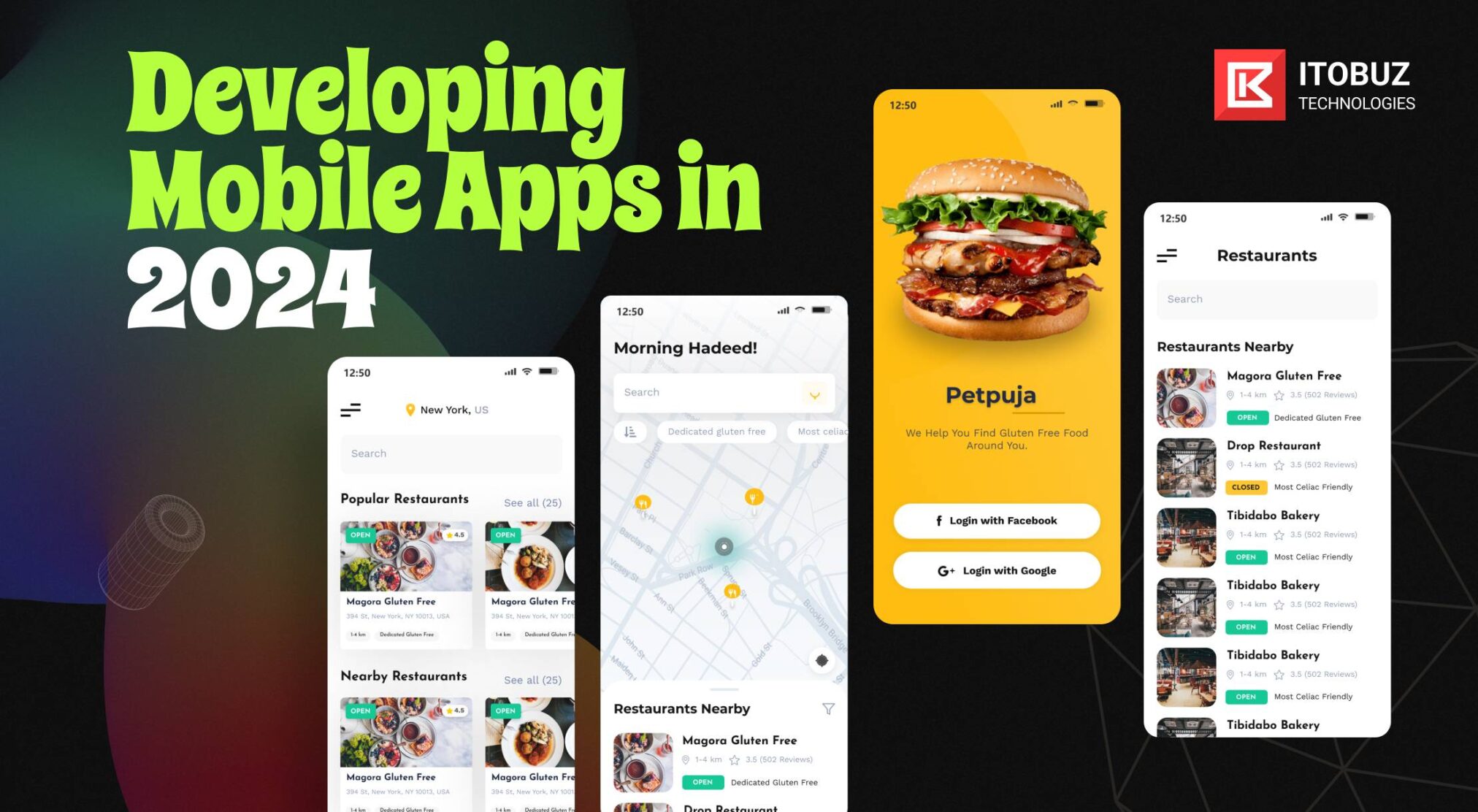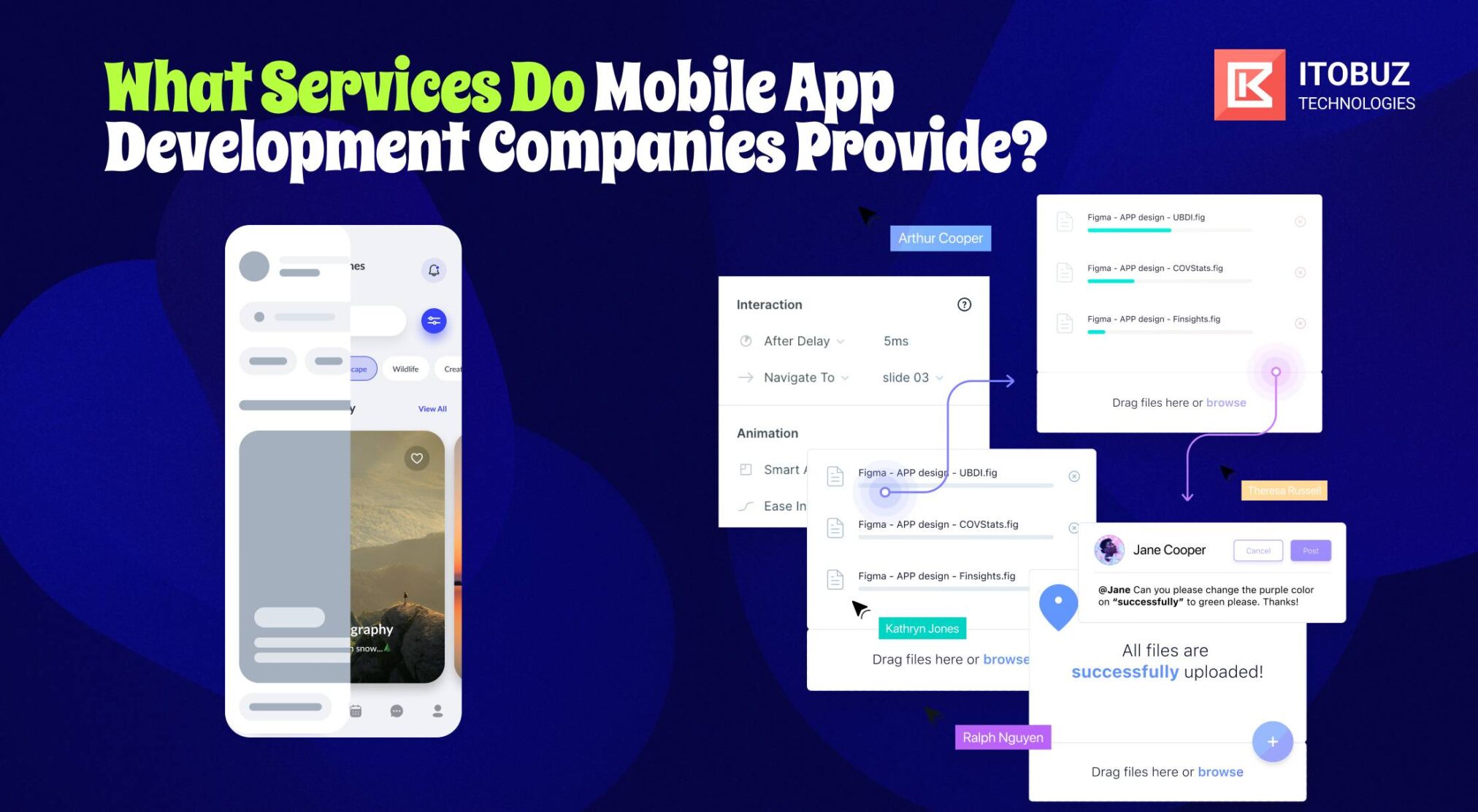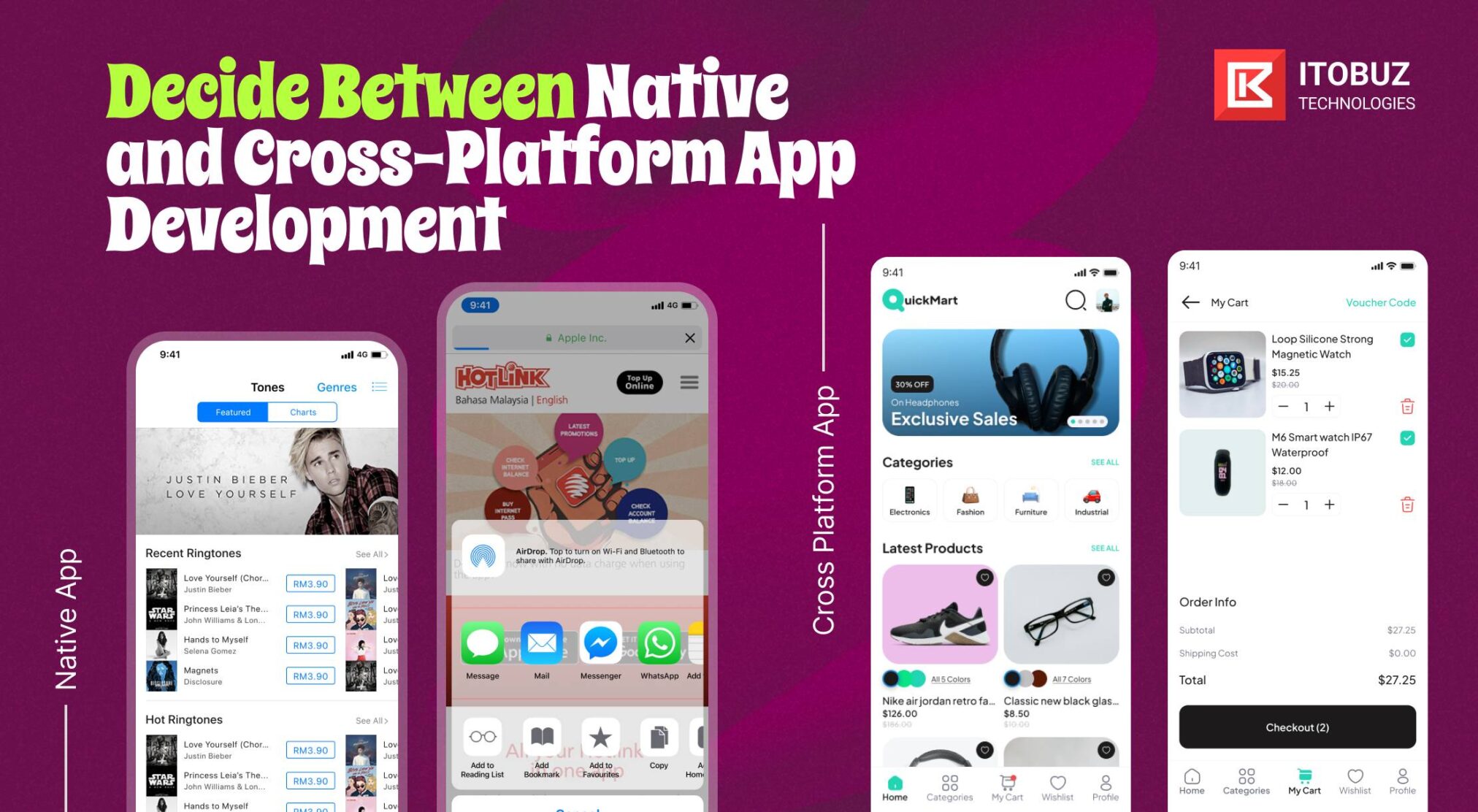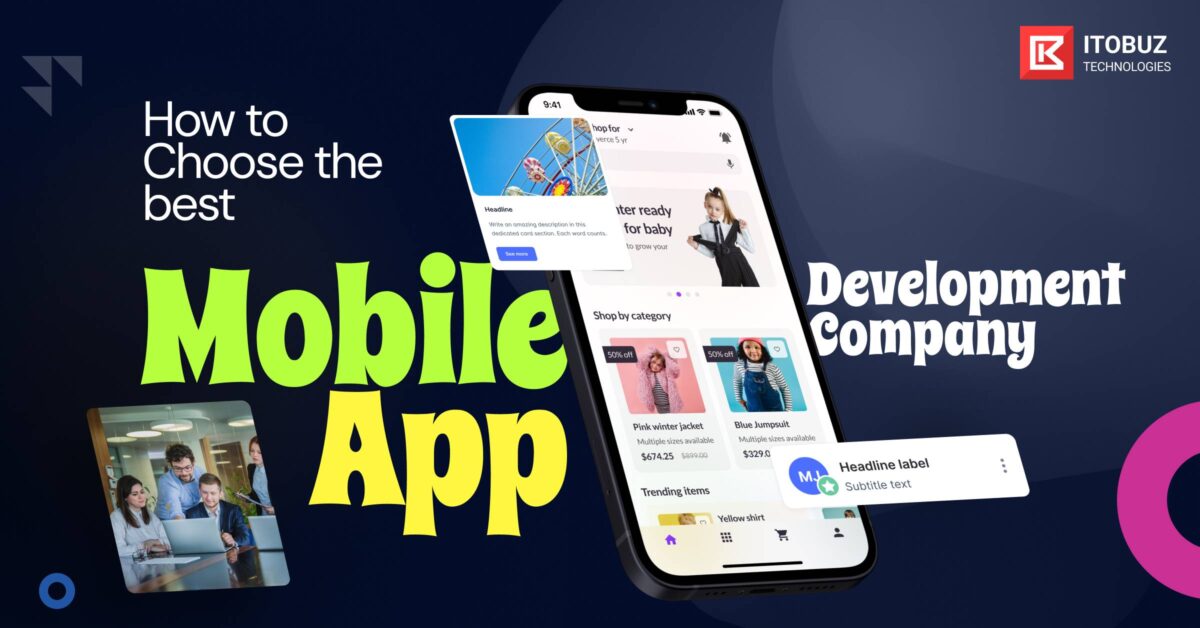How to Choose Best Mobile App Development Company
Are you in the process of building a brand-new app for your business? Allow us to explain how to choose a mobile app development company that won’t cheat you or deliver a subpar product. Here’s a sneak peek at what you will learn in this article:
- The current state of the mobile app development world
- What mobile app development companies do and what you can expect from them
- Different mobile app development methodologies
- How to select a mobile app development company that offers a comprehensive development package and transparent pricing structures
Let us proceed!
Developing Mobile Apps in 2025

Smartphones have fundamentally transformed how we live, work, and play. The credit for this transformation undoubtedly goes to apps. From facilitating on-demand services such as grocery delivery to enabling virtual healthcare solutions, mobile apps can cater to a vast array of needs. They have seamlessly woven themselves into the fabric of our daily routines.
No wonder the global mobile app industry is booming! The Apple app store now has 123 times as many apps as it did 15+ years ago. Currently growing at an impressive rate of 8.83% p.a., the industry is projected to reach a staggering valuation of $673.8 billion by 2027.
This growth translates to a massive opportunity for businesses to reach and engage with their customers in innovative ways. If your business does not already have its own, user-facing app the decision to invest in a brand-new, custom mobile app is a no-brainer.
However, building a truly impactful mobile app is not easy. You will need more than just a scaled-down, mobile-friendly version of your website. You will need a skilled, experienced, and reliable mobile app development company as your partner. They are the architects who will translate your vision into a user-friendly, feature-rich app that drives engagement and achieves your business objectives.
Mobile App Development: Your Options
“Mobile app development” is the process of creating applications (downloadable programs) that offer ‘native’ experiences on smartphones. Unlike responsive or mobile-friendly websites, mobile applications are optimized for specific smartphone operating systems (Android, iOS, or both). They can be preinstalled on phones or downloaded from app stores or the Internet.
Most mobile apps need a live connection to the Internet to function properly. So, the process of mobile app development typically involves:
- Building Installable Software Bundles: This stage involves building the app’s core package in a format compatible with the targeted operating system (.ipa for iOS or .apk for Android). This bundle encapsulates the app’s code, resources, features, and functionalities.
- Implementing Backend Services: Mobile apps rely on backend infrastructure to handle tasks like data storage, user authentication, etc. Developers connect mobile apps with backend servers and services by using Application Programming Interfaces (APIs). APIs facilitate smooth data exchanges and operations.
- Device Testing: To ensure optimal performance and user experience, the app undergoes rigorous testing on all target devices with different screen sizes, operating system versions, and hardware specifications. In this stage, all bugs and compatibility issues are identified and addressed.
In the early days of mobile app development, the primary focus was on creating device-native apps. This approach involves building apps specifically designed for either the Android or iOS operating system.
Native app developers leveraged the full capabilities of each platform, delivering optimal performances, flawless user experiences, and smooth access to built-in device features.
We are talking about navigation apps that require easy access to device hardware like GPS systems or graphically intensive mobile games that call for seamless integration with device features like the accelerometer.
However, both iOS and Android app development had a significant drawback: the need for separate development efforts for each platform. This resulted in increased costs and longer development timelines for businesses aiming to reach both Android and iOS users.
With the rising demand for broader market reach and swifter deployment, the industry witnessed a shift towards cross-platform app development. In this development approach, app development frameworks like React Native or Flutter are used to create apps that can seamlessly function on both Android and iOS platforms, using a single unified codebase.
By using a single codebase that could be deployed across multiple platforms, app development companies streamlined their development processes and reduced the time and resources required to maintain separate projects for iOS and Android devices.
What Services Do Mobile App Development Companies Provide?

Now that we have a brief idea of how mobile app development companies have evolved, let us find out what exactly they do. A typical, modern-day mobile app development provider will comprise a team of UI/UX designers, project managers, marketing professionals, and custom app development specialists. They work collaboratively to translate your vision into reality by providing the following set of services:
UI/UX Development
This phase tackles two important aspects of the development process: creating a compelling visual identity for the app and ensuring seamless functionality for each feature and user interaction point within the app.
Mobile app development companies leverage the expertise of professional UI/UX designers to create an easy-to-use, intuitive, and visually appealing application.
Prototype Development
Once the app’s visual strategy is established through comprehensive UI/UX design, development companies create a prototype to validate their design approach. This prototype may not be functional, but it will offer a glimpse into the app’s core functionalities and visual elements.
New-age development companies use industry-standard prototyping tools to rapidly iterate on different design ideas and create multiple prototypes. By doing so, they identify all potential user experience issues with their vision before diving into full-scale development.
App Development
Now it is time to bring the refined app vision to life. Mobile app development companies use a wide range of technologies and programming languages to create a functional and feature-rich app tailored to your preferences and project requirements.
If you are developing a native app specifically for individual operating systems, your developers will use platform-specific technologies like Objective-C, C++ and the like.
Native apps, by far, offer the best possible visual aspects and functionality; but your developers will need to build separate codebases for each platform which will drastically increase project costs.
Hybrid apps, on the other hand, can function across multiple platforms with just one, unified codebase. Flexible frameworks like React Native, HTML5 and CSS are used to build the codebases of hybrid apps, making them a cost-effective choice for many businesses relying on enterprise mobility services to streamline their mobile development strategies.
App Testing, Marketing, and Maintenance
Prior to the app’s market release, thorough testing is essential to identify/rectify bugs and usability issues. This can be achieved through manual testing on different target devices and automated testing tools.
New-age development companies also help their clients market their apps by providing App Store Optimization (ASO), a strategic method of increasing the app’s visibility and conversion rate in app stores. It involves optimizing various elements of the app’s listing, such as its title, description, icon, screenshots, etc.
Post-launch, the app will need regular maintenance to function optimally and stay relevant. Development companies will provide bug fixes, security updates, and feature enhancements to keep pace with evolving mobile app development trends, user expectations, and smartphone technologies.
How to Choose a Mobile App Development Company
With a plethora of development companies vying for your attention and your money, choosing the right partner can be tricky. Before embarking on the search for the ‘right’ mobile app development company, you need to lay the groundwork for a successful search:
Market Validation
Coming up with a compelling app concept is just the first step. Market research is critical to validate the need for your app and identify the problems and pain points it can resolve for your target audience.
Conduct surveys, user interviews, and focus groups to identify user needs, potential barriers to adoption, and any app-related concerns they may have. This user-centric approach will ensure you do not spend big on an app idea that does not address genuine user needs.
Decide Between Native and Cross-Platform App Development

Choosing between native and cross-platform development for your app requires careful consideration of several factors. Budget and development time are the main concerns.
Native apps, while offering superior performance and easier access to built-in device features, come with the drawback of needing separate codebases for iOS and Android, leading to higher costs and longer development timelines.
Cross-platform development offers a faster and more cost-effective solution with its single codebase. However, these apps tend to have limitations in performance and feature integration compared to their native counterparts.
Security and maintenance are two other key aspects you need to evaluate. Native apps leverage built-in smartphone OS security protocols; hence they usually offer maximum protection from external security risks.
Cross-platform apps offer a slightly lesser degree of security. However, maintaining and updating cross-platform apps (including security updates) and their unified codebases is much easier. Ultimately, the ‘right’ approach will depend on your target audience and project requirements.
If your target users primarily use one platform or the other (Android or iOS), opting for native development might be ideal. However, if reaching a wider audience across all platforms while saving money is your priority, then cross-platform development offers a compelling solution
Define Your Business Model
Will you monetize your app upfront, in-app, or work on a freemium model where users only pay to access advanced functionalities? Having a clear understanding of your revenue generation strategy is key before you dive into the market.
Budgeting and Timelines
Before soliciting quotes from development companies, establish a realistic budget that reflects the app’s value proposition. Remember, opting for companies that offer extremely low prices may lead to challenges like communication barriers due to time zones or language differences. Setting a clear timeline for development is equally important.
Defining these parameters upfront will allow you to trim down the pool of potential companies as those that do not align with your budgetary constraints or development timeframe will be immediately disqualified.
Now that you have laid the groundwork, it’s time to start the search.
1. Review the Portfolios of Top Mobile App Development Companies
Start by browsing the portfolios of different app development companies. Look for projects similar to your app in terms of type (e.g., shopping, gaming) and industry. This will give you a sense of their experience and style. See if the companies you are considering use the tools and technologies to build your native or hybrid app’s features.
Case Studies
Look for case studies highlighting how the company’s native or hybrid app development solutions have helped other businesses grow. Download and review the apps built by them. Review their UI/UX features, total downloads, and other quality-related factors.
Team Analysis
Make sure the companies you consider have big enough teams to take on the project. Ideally, the companies’ websites should feature long lists of skilled CTOs, developers, designers, project managers, and specialists in the tools and technologies used in your project. Check out the LinkedIn or GitHub profiles of these professionals during the research to gain a better understanding of their actual skills, not just what they advertise on their websites.
Communication
Smooth communication is essential for any successful project. Look for mobile app development companies that are easy to reach and responsive to your inquiries. If you get radio silence after your initial contact, it is best to remove them from your shortlist.
Remember, you are building a complex solution, and reliable communication with the technical architects is crucial. They need to be in constant dialogue with your team and stakeholders to ensure everyone’s on the same page and the project stays on track.
A company that prioritizes clear and consistent communication is a strong indicator of a smooth and successful partnership.
2. Reach Out, Schedule a Consultation, and Request References
Use the contact forms, email addresses, or phone numbers mentioned on their websites to get in touch. Briefly introduce yourself, explain your project idea, and express interest in a free consultation or quote. If they offer free consultations, take the opportunity to ask as many questions as possible. ask about their development process, their experience with similar projects, their technical expertise, and their project management methodologies which ideally should include a clear timeline, defined milestones, and specific deliverables.
Gauge their level of professionalism, responsiveness, and ability to communicate effectively. Do not feel coy about asking for references from past clients. Reach out to these references with similar questions to get a well-rounded understanding of the companies’ qualities and potential misgivings. Lastly, compare the final costs quoted by your shortlisted companies.
3. Compare Their Services
Now that you have a solid shortlist, let us get to the nitty-gritty of comparing their services:
Experience
Look for companies with a proven track record of success in developing high-quality apps similar to the one you want to develop. Do they specialize in iOS, Android, or cross-platform solutions? Go for a provider that can match your project’s specific needs.
Review a few of the apps they have built and assess factors like loading speed, user interface (UI) quality, and the apps’ user engagement metrics (e.g., total installs, conversion rates, user retention rates, etc.). This intel will help you determine if they can deliver an app that meets your expectations.
Tech Stack
Evaluate their technical skills and their tech stacks. What programming languages do they use? Are they experts in native or cross-platform development? If you require a resource-intensive, native app, a company experienced in native development will be the better fit.
Project Management
Ask about their approach to managing app development projects. Many new-age companies use methodologies like DevOps or Agile to ensure efficient collaboration with their clients. DevOps focuses on breaking down silos between development and operations teams, fostering continuous communication throughout the dev lifecycle.
Agile emphasizes iterative development in short, planned sprints, allowing for quick adaptation and continuous communication. Understanding their preferred methodology and how they tailor it to your project is crucial for meeting defined milestones and receiving deliverables on time.
Online Reviews
Check out review websites like Clutch.co, GoodFirms, etc., to see what past clients say about each company. Reviews offer valuable insights into the company’s experience with different industries and project types.
Post-Launch Support
Not all companies offer post-launch support. Find out if they provide services like app updates, data backup and restoration, and ongoing maintenance. Ideally, the company of your choice will be a long-term development partner that can play an equal role in ensuring the continued success of your app.
Final Take
By thoroughly comparing these factors across your shortlist, you’ll be well-equipped to boil down your shortlist and understand how to choose a mobile app development company that perfectly aligns with your project’s needs and vision. Remember, when it comes to developing mobile apps, an idea can change the world. So, if you have a great app idea, all you need to change the world is the right partner, someone like Itobuz!

comments
comments for this post are closed